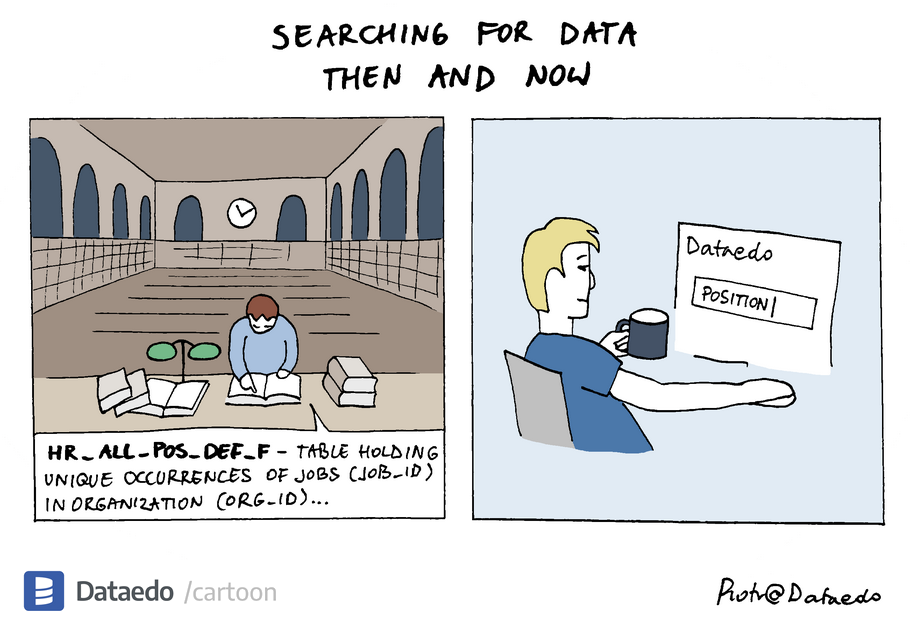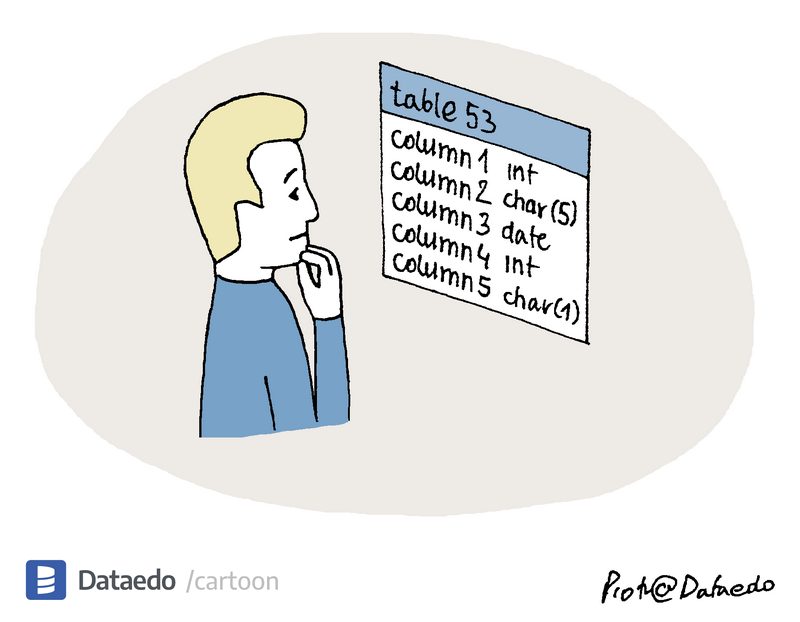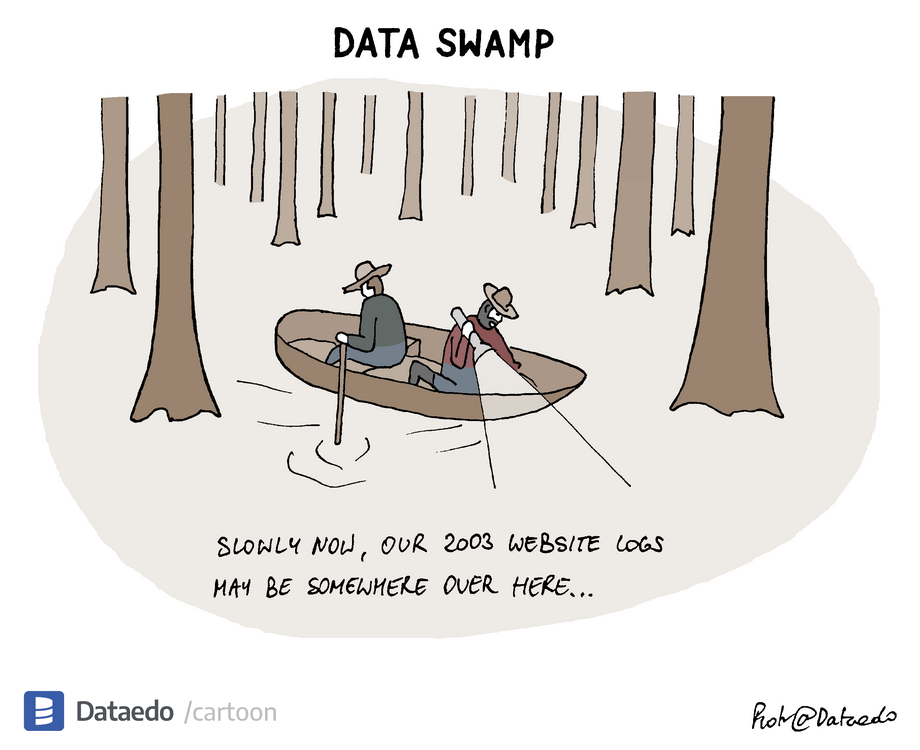This article provides an overview of use cases of Dataedo. Please note that this is just a selection of use cases. Understanding of data can make a big difference with any data related projects and initiatives.
BI teams
Dataedo helps BI teams and professionals become more productive in their work. They can spend more time on analyzing data and building reports, and less time on finding data and figuring out the data schema.
Benefits for BI professionals:
- Better understand data - data warehouse, CRM, ERP, applications, other sources,
- Increased productivity,
- Faster onboarding of new people.
Self-service BI
BI tool vendors promise self-service analytics to non-technical people. In reality, access to the data with reporting and visualization capabilities, without understanding of the data elements might not be enough. Dataedo provides a context around data (metadata) - meaning, purpose, source, status, or quality of data elements in the source; collaboration capabilities that allow then to engage with data community and experts in their organization.
Benefits for business and data users:
- Easier discovery of available data in organization,
- Better understanding of data,
- Collaboration with data community and experts.
Data Warehousing
Data warehousing projects are expensive - hardware, software, development costs (data warehouse architects, data engineers) - and their value often is vague. You put a lot of effort into finding, extracting, transforming, cleansing, and loading data into data warehouse, and need to maintain it every day, and your organization is not using its full potential. Why? Because people (data analysts, BI developers, data scientists, business users) do not know what data exists, which tables and columns hold what data, or what is the source or calculation of fields.
Benefits for organizations having Data Warehouses:
- Popularize data warehouse in organization with convenient documentation,
- Facilitate understanding of data in data warehouse,
- Build trust in data in data warehouse,
- Enable more universal use of data warehouse across organization and projects,
- Maximize ROI of data warehouse.
Data Lakes
Data lakes are data stores that hold unstructured and semi-structured data. Structured data stores (usually relational databases) offer view into data structures (tables and columns). Data lakes do not offer that functionality. Without data governance data lakes can quickly become data swamps. Finding right data in the data lake and understanding its structure can be a real challenge. Dataedo offers discovery of structure in semi-structured data formats (JSON, XML, CSV), cataloging of data objects, documentation capability of each object and field, and discoverability with convenient web documentation.
Benefits for data lakes
- Data governance in the data lake,
- Convenient browsable and searchable web documentation,
- Discover and document structure of data in JSON, CSV, XML.
Database development
Every software engineer building software that stores data in a database should have a good understanding of its schema - purpose of tables, columns, their relationships, etc. During development, this schema evolves, new tables and columns are added, existing ones change purpose or are retired. For the team to be prodctive, every developer should be up to date with the schema of the database it is working with. Dataedo allows you to collaboratively document schema of the database with a convenient UI and share it across entire team in useful HTML documentation as a part of your code build process.
Benefits for software development teams:
- All developers get clear, up-to-date view of database schema,
- Schema change tracking help with staying informed on changes,
- Easier and less expensive to scale the dev team or outsource some of the work.
Data Governance, Data Stewardship, Metadata Management
Data Governance defines policies, processes, and roles (e.g., owners) around managing organization's data assets to improve its quality, security, and value. Data Stewardship is operational aspect of Data Governance. Stewards write policies, analyze data quality, collect metadata, and document business and physical data elements, classify data, and work on improving quality and usability of data. Dataedo provides a metadata management platform where stewards can easily discover and document acual data in various organization's databases.
Benefits for organizations implementing data governance:
- Help data stewardss in building and curation of data definitions and documentation in data dictionary, data classifications, and business glossary with Dataedo metadata repository,
- Improve data discoverability, usability and trust with data catalog and documentation shared in accessble web portal,
- Crowdsource knowledge and get feedback from everyone in organization with community module.
Data Protection, GDPR, CCPA
Most governments around the world increase regulation around protection of personal sensitive data. Recently introcuded regulations such as European GDPR or CCPA in California force businesses of all sizes to implement procedures on managing personal data. Dataedo allows you to make inventory of your data and help find and classify data elements holding sensitive data, so that your organization can be aware where personal data is stored and is able to implement required procedures.
Benefits for organizations complying with data protection regulations:
- Make an inventory of all the sensitive data in your databases,
- Grow awareness of data protection in BI, development and everyone working with data.
Legacy applications
Applications overt time tend to get complex, convoluted or even unmanageable. Many years of undocumented ad hoc changes by multiple people may create a monster that may no longer be further developed. Adding another one quick update may cause the whole thing to come crashing down. Or when you inherit some legacy undocumented application and there's no one around from the team that implemented and maintained it. This is when you should stop, reverse engineer every module, document every component, catalog it and draw series of schemas. Dataedo can help you with this task. You will be able to figure out what is used and what is not, what are the key tables, how they are related, and so on. That will help you refactor and further develop the system.
Benefits for that need to work with/redesign of legacy applications:
- Convenient database reverse engineering capabilities,
- Inventory and documentation of system as-is,
- Ability to categorize each object based on their status,
- Ability to break down large databases into smaller pieces with Subject Areas/Modules.
Development outsourcing
Outsourcing development is a risky endeavor. It is crucial to find a reliable partner. Many organizations choose to outsource the work - they want to focus on their core business and leave the software to the professionals. But that can cause the risk of vendor lock-in - only that company knows how things work. Customer may be at the mercy of the vendor and may have to take whatever quotes and deadlines are provided.
But it does not have to be that way. With the proper code and database documentation (and right agreement terms), getting out of bad relationship with a vendor may be achievable. Just pass the code and documentation to another team (internal or external). There will be a slowdown and learning curve, but that could be feasible. Just require documentation in the agreement, vendor will document their deliverables and Dataedo will provide a platform for the documentation.
Benefits for the company:
- Shift power back to the company,
- Easier move project internally or to new vendor.
Benefits for the vendor:
- Additional value added for the customer - documentation and reusability of work,
- Less friction - mitigate customer fear of lock-in - if customer knows it's easier to quit and change vendor, he is more likely to go ahead with the project.
Database documentation
Sometimes you need to create documentation of the database, for auditig purposes or as a deliverable in your project. Dataedo can automatically generate interactive HTML or PDF documentation from your database schema. You are also able to document keys and relaionships and visualuze data model with ERDs.
Benefits for database documentation:
- Generate beautiful, interactive documentation automatically in minutes,
- Delight your customers and satisfy auditing requirements.











 Piotr Kononow
Piotr Kononow



